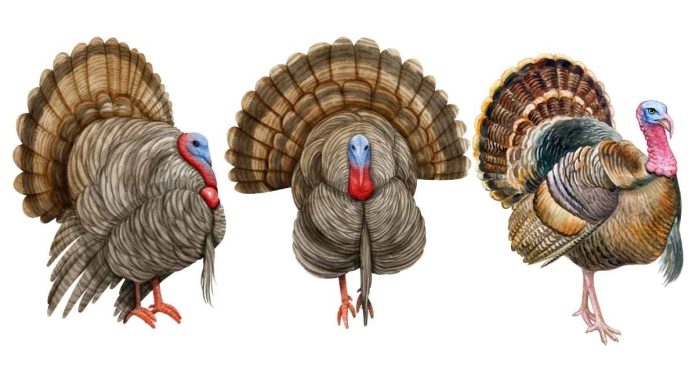Wild turkeys, an iconic bird native to North America, are known for their impressive size, distinctive plumage, and unique behaviors. Scientifically, wild turkeys belong to the genus Meleagris, with the full scientific name of the species being Meleagris gallopavo. This name not only reflects the bird’s biological classification but also provides insight into its natural history and characteristics.
Breaking Down the Scientific Name: Meleagris gallopavo
- Genus: Meleagris
- The genus Meleagris includes the two species of turkey: the wild turkey (Meleagris gallopavo) and the ocellated turkey (Meleagris ocellata), which is found in parts of Central America. The word “Meleagris” is derived from the Greek word meleagris, meaning “a kind of guinea fowl,” as early European settlers thought the wild turkey resembled the guinea fowl from Africa.
- Species: gallopavo
- The species name gallopavo combines Latin roots: gallus, meaning “cock” (male bird), and pavo, meaning “peacock.” The term reflects the turkey’s prominent appearance, with its impressive plumage and striking display during courtship. Gallopavo was used to describe the bird because of its resemblance to the peacock, another large and colorful bird.
Wild Turkey’s Classification
- Kingdom: Animalia (Animal)
- Phylum: Chordata (Animals with a spinal cord)
- Class: Aves (Birds)
- Order: Galliformes (Heavy-bodied, ground-feeding birds)
- Family: Phasianidae (The pheasant family, including turkeys, quails, and partridges)
- Genus: Meleagris
- Species: Meleagris gallopavo
Distribution and Habitat
Wild turkeys are primarily found in North America, particularly in forests and woodlands of the eastern and central United States. They thrive in a variety of habitats, including deciduous forests, grasslands, and mixed woodlands. The birds are well adapted to living in both forested and open environments, often foraging on the ground for food such as seeds, insects, and small plants.
Domestication and Relationship to the Domestic Turkey
The wild turkey (Meleagris gallopavo) is the ancestor of the domesticated turkey, which was selectively bred by indigenous peoples in North America long before European settlers arrived. The domesticated version, while still retaining many characteristics of its wild ancestor, has been altered in size and behavior for farming purposes. The domesticated turkey is scientifically classified under the same species, Meleagris gallopavo, but has been bred to be larger and more suitable for commercial production.
The scientific name for the wild turkey, Meleagris gallopavo, reflects both its evolutionary connections to other birds like the guinea fowl and peacock, and its striking appearance. This species continues to be an important part of North America’s wildlife, symbolizing the richness of the continent’s natural heritage. Whether you’re encountering them in the wild or learning about them in a more scientific context, the wild turkey’s name remains a testament to its fascinating biology and historical significance.


